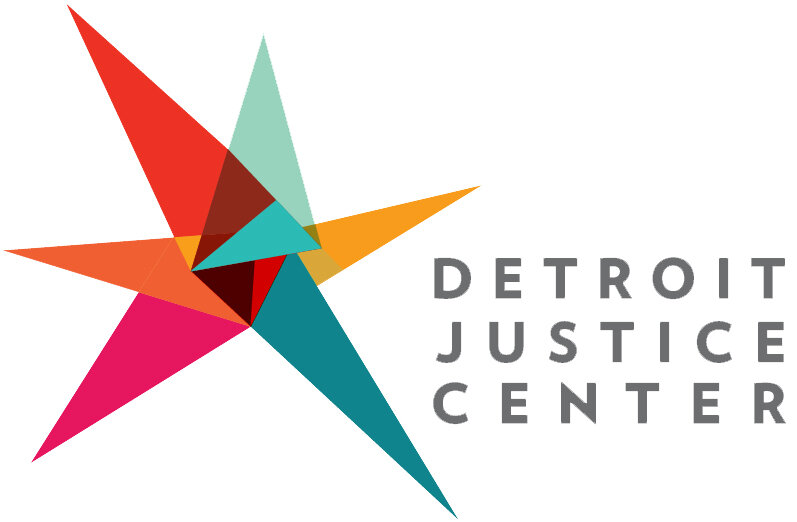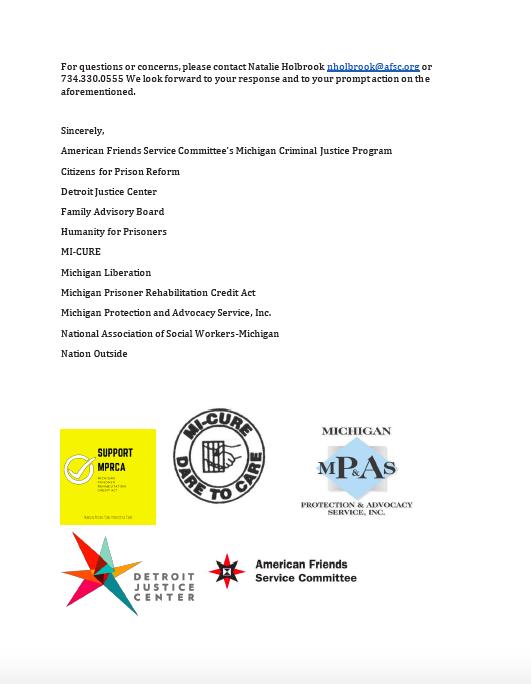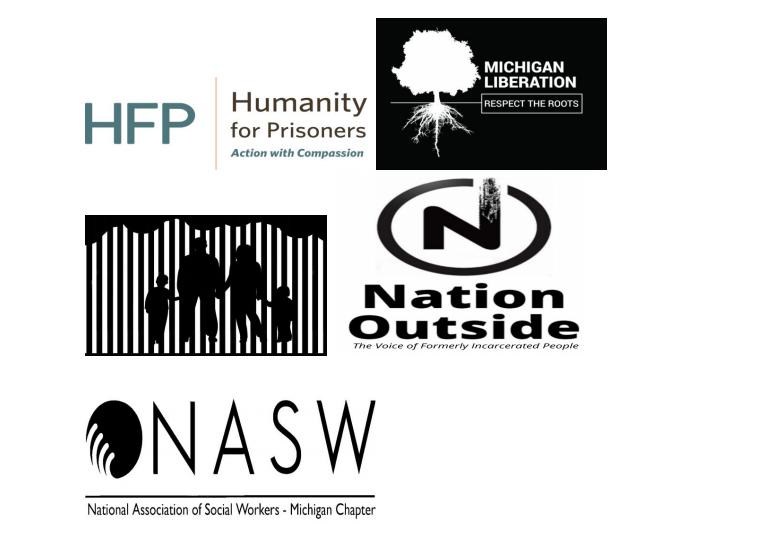Full Text:
April 6, 2020
RE: PLEASE ACT NOW! Letter regarding executive order on prisons from advocacy
organizations: AFSC-MI, Citizens for Prison Reform, Detroit Justice Center, Family Advisory
Board, Humanity for Prisoners, MI-CURE, Michigan Liberation, Michigan Prisoner
Rehabilitation Credit Act, Michigan Protection and Advocacy Service, Inc., National
Association of Social Workers-Michigan, Nation Outside
Dear Governor Whitmer and Director Washington,
We understand you all are overwhelmed with a historical pandemic and doing your best to
negotiate this turbulent time. We also understand you are inundated with
recommendations from various stakeholders and powerholders. We represent
organizations directly connected to people in prison in Michigan. Many of us have been
incarcerated in Michigan’s prisons or love people living in Michigan’s prisons. We want our
voices to be heard and we would like to consult with as you make decisions regarding the
treatment of people in the prison system.
There is no doubt in our minds that the best way to manage the Covid-19 challenge in
Michigan’s prison system is to release as many people as possible as quickly as
possible. We believe that can be done without compromising public safety, and in the best
interest of public health, but it will require the system to consider different rules.
We have also listed out recommendations for addressing conditions for those people who
are left behind.
The following recommendations apply to individuals who score high or average
probability on the Parole Guideline Score Sheet and have a home placement
available to them:
• Release individuals who are past their ERD. This would include individuals who
have not been able to complete recommended programming. Waive all
requirements for programming and psychological evaluations.
• Release individuals who are serving time for a technical rule violation.
• Suspend truth in sentencing. Michigan is an outlier in requiring individuals to serve
the entire minimum sentence before being considered for parole. Consider
releasing individuals who have served half the minimum sentence.
• Restore good time & disciplinary credits and earned credits to individuals who have
demonstrated years of good behavior.
• Apply good time & disciplinary credits and earned credits to those serving habitual
sentences.
• Release individuals who are infirm, elderly, and medically frail.
• Release people who are receiving care for cancer and other chronic conditions that
require frequent off-site care to their loved ones, immediately.
• Create substantive plans for continuing medical care post-incarceration for any
person who is currently being treated for a serious medical condition and is
released to address COVID 19 concerns.
• Initiate electronic public hearings for all people who are awaiting them and/or who
were about to be scheduled for them.
• Treat individuals who are serving long indeterminate sentences as if they were
parolable lifers and consider them for parole on the same schedule as lifers.
• Begin a robust effort to process and expedite commutations.
• Increase the size of the parole board to facilitate faster processing.
• Use electronic public hearings to expedite commutations.
• Re-entry monies must be targeted for people released from prison. This includes
providing cash assistance relief for people coming home by using both stimulus
money and pooling emergency grants from philanthropic institutions. This also
includes providing access to providers who can offer recovery assistance for people
who use drugs and medication assisted treatment and overdose support
The following are recommendations for those left behind in the prison setting during
the pandemic and, also, for after the pandemic:
• Protect people who are ill with COVID-19 and/or exposed.
o Make sure no one is alone while they are living with COVID-19, or while they
are under quarantine for close contact observation.
o Provide care in the form of frequent access to water, warming foods, pain
relievers, and fever reducers.
o Provide out of cell time for all people with COVID-19 and people under
quarantine for close contact and/or full units under quarantine—fresh air is
critical.
o Provide minimal property like sweatshirts, slippers, tablets, books, writing
materials, etc.
o Keep families informed of what is going on with isolated people.
o Continue to provide masks, soap, and disinfectants that combat the virus.
• Provide free phone calls for people in prison and their communities. The state
should cover the costs associated with the GTL contract. The state should
immediately end the special equipment fund and bring calls down to 3.4 cents per
minute. The state should then cover this GTL rate.
• Stop up charging people for store items. Eliminate the 38% surcharge that goes to
the state for store items.
• Provide indigent people in prison with money to purchase store items.
• Provide care for people who are not COVID positive who have chronic health
conditions.
• Create separate field medical centers in each prison to care for people who need
ongoing care and are not COVID positive.
• Suspend shake downs and pat downs as these contribute to increased cross
contamination.
• Suspend the issuing of all misconducts unless violent.
For questions or concerns, please contact Natalie Holbrook nholbrook@afsc.org or
734.330.0555 We look forward to your response and to your prompt action on the
aforementioned.
Sincerely,
American Friends Service Committee’s Michigan Criminal Justice Program
Citizens for Prison Reform
Detroit Justice Center
Family Advisory Board
Humanity for Prisoners
MI-CURE
Michigan Liberation
Michigan Prisoner Rehabilitation Credit Act
Michigan Protection and Advocacy Service, Inc.
National Association of Social Workers-Michigan
Nation Outside





